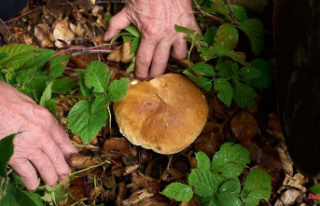Kassel (dpa/lhe) - The Hessian apple harvest is good this year, but the apple farmers are not finding enough buyers. The hot summer has caused difficulties for some varieties, as reported by the Hessian Farmers' Association. At the same time, the sun was good for the taste. Despite this, sales are stagnating - with increased production costs, as the Landesbetrieb Landwirtschaft Hessen (LLH) criticized.
According to the Hessian Farmers' Association, two thirds of this year's apple harvest have already been completed. The rest will follow in the next two to three weeks. "The apple harvest has been going well so far and better than expected," said Marie-Claire von Spee, spokeswoman for the farmers' association. "Overall, a medium to good harvest is expected, with some differences in yield depending on the location."
The earlier varieties and especially younger trees would not have tolerated the long heatwave in summer well. There are many small fruits. Sunburn and pitting symptoms had occurred with some apples. These are small, brown, dry spots on the shell.
Due to the rain in September, many fruits burst after the intense heat. The cooler temperatures and the rain would have done the fruit good afterwards. "This year, the apples are convincing due to the large amount of sunlight with a very good taste quality, high fructose content and sweetness," said the spokeswoman.
In the northern Hessian Werra-Meißner district, the harvest is still in progress, as reported by the state farm: "The trees are full." Most apples have already been harvested in southern Hesse. According to LLH, the yield is good, but not above average.
"Despite the good harvest, food retailers offer almost exclusively imported fruit," criticized Agata Stawinoga from the Horticulture Information Center at the LLH. Although increased energy costs for transport and cooling are reflected in the prices, imported apples are still cheaper than domestic apples due to lower labor costs. "They therefore primarily end up on the shelves and in the shopping basket."
According to the state agency for agriculture, another problem is that the production costs for apple farmers are increasing, but the price at the wholesale market remains the same. Sales in direct marketing are also stagnating at a rather low level, explained fruit cultivation consultant Marcel Trapp from the LLH. As a result, the fruit growers were left with their apples. Unmarketable apples are either sold to juice producers or stored.












